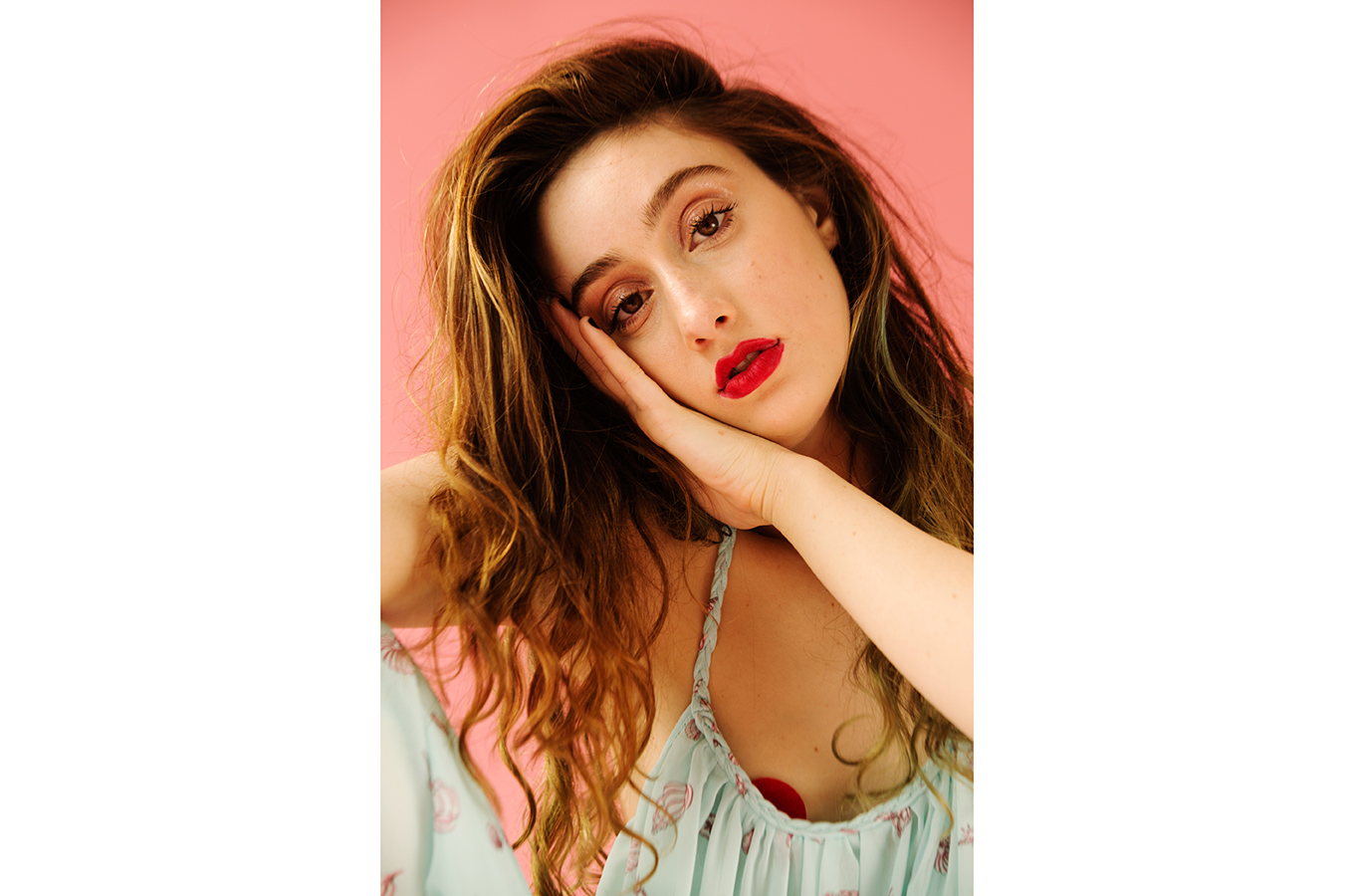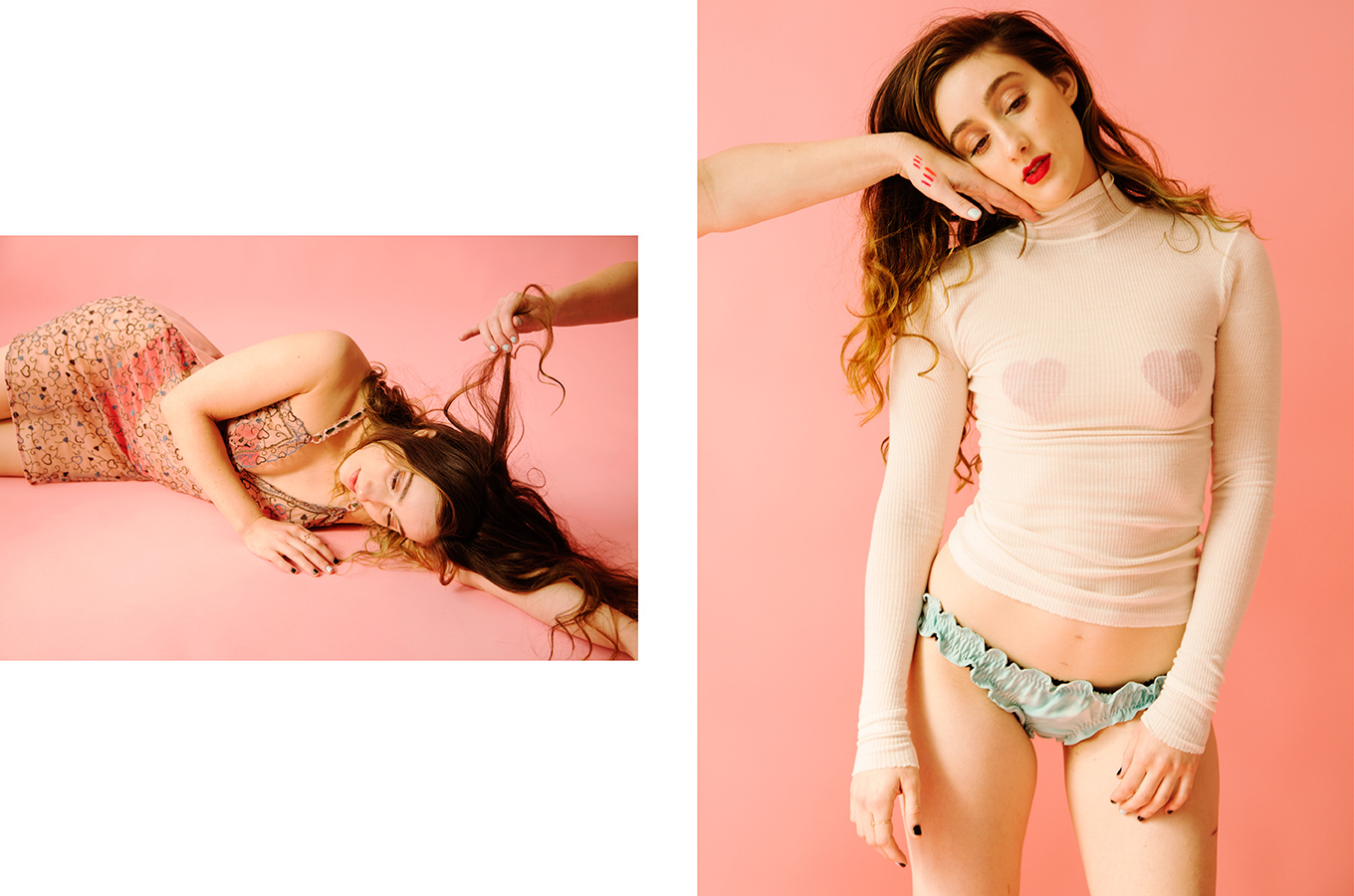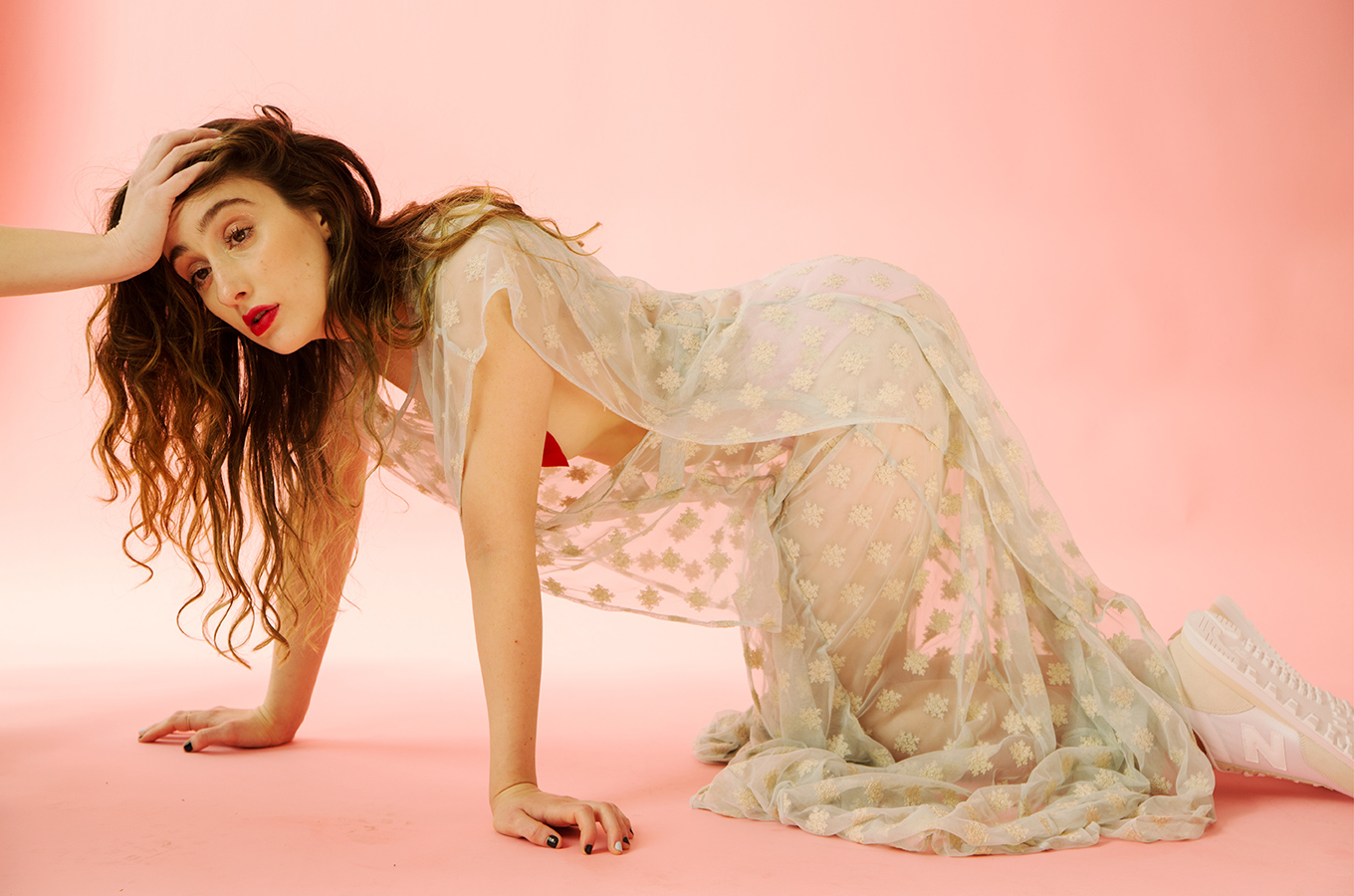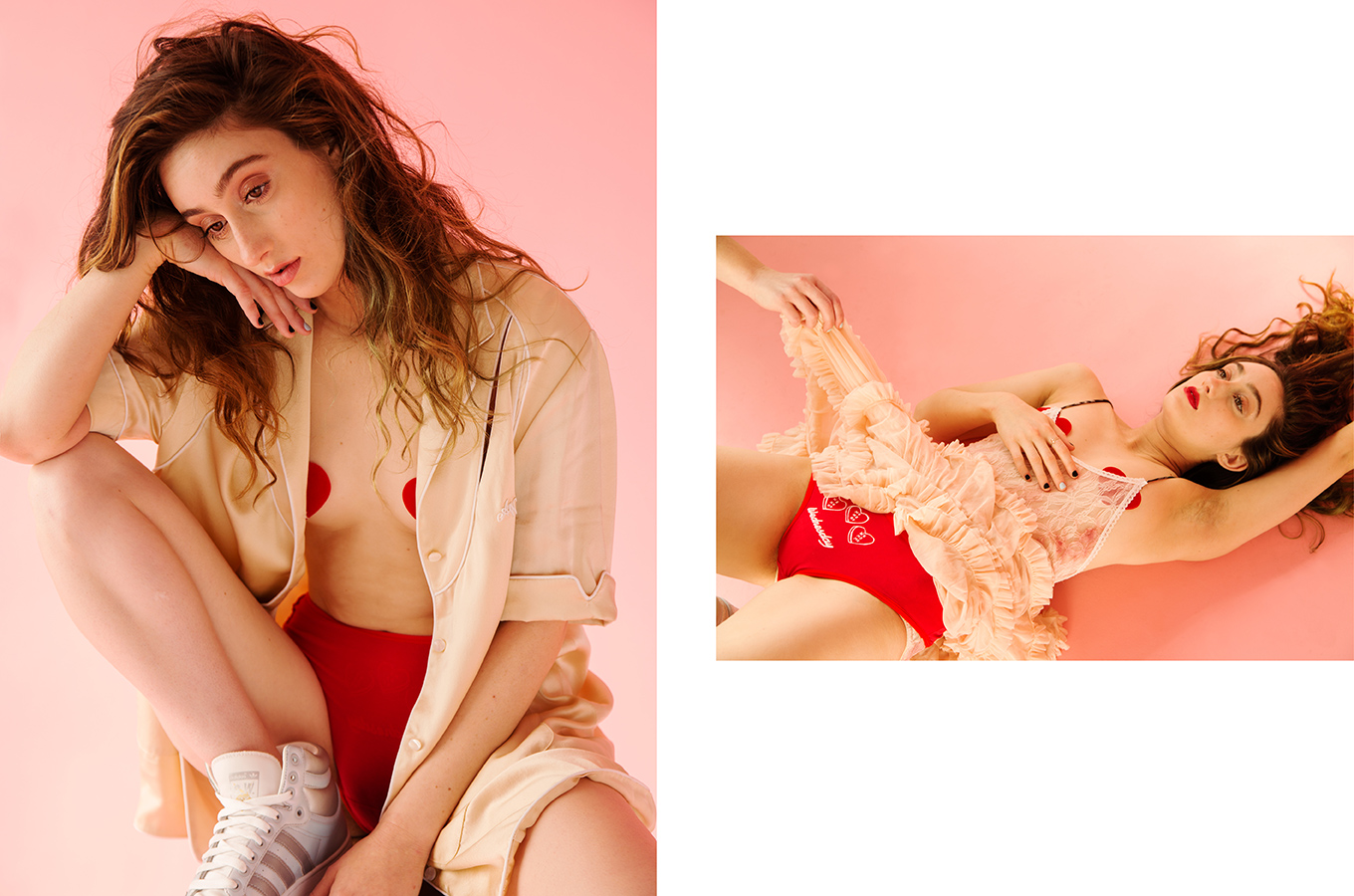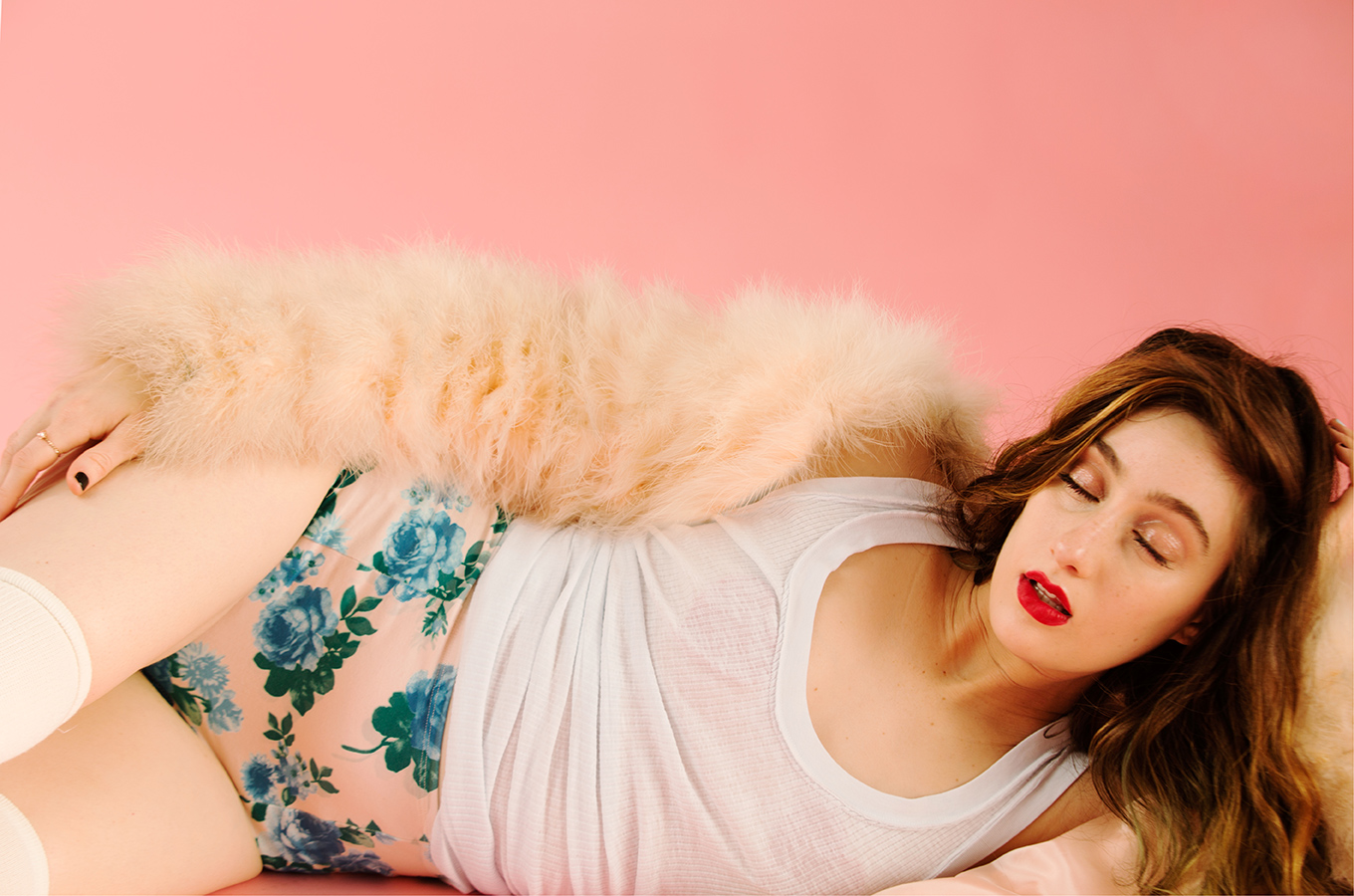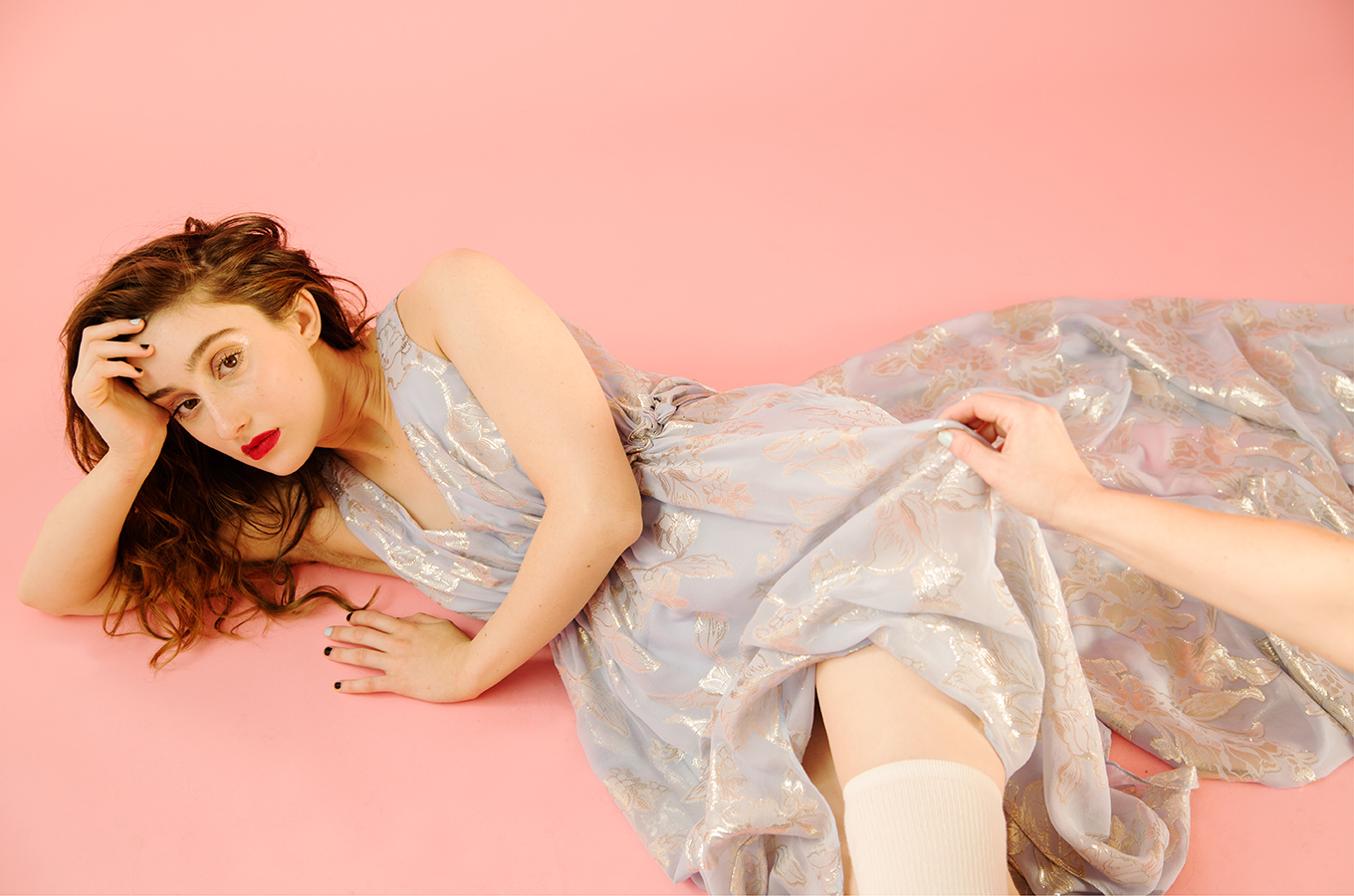Liphemra
Interview by Adi Rajkovic
Images by Arvida Byström
Styling by Lisa Mosko
Makeup by Amy Chance
“I’ve always thought about Liphemra as being able to
tour with a rapper. I want to make songs
—Liphemrathat can be taken as hooks and sampled out.” — Liphemra
LIPHEMRA
Liphemra is the project of drummer and vocalist Liv Marsico, who was a member of LA band Gothic Tropic and has drummed for Cold War Kids as well as various other bands. Marsico formed Liphemra in 2013 and has since released a mixtape entitled Part 3 (2014) and the 2015 single “did u cry.” Liphemra now includes members Trey Findley, Miles Gray and Chris Parise and will release a new single “feel nothing” in April.
ADI RAJKOVIC
Artist and curator Adi Rajkovic founded Los Angeles art gallery Sunday with partner Teryn Brown in 2014. The space, located in their living room, showcases the work of friends and emerging artists in the LA art community. Sunday has drawn acclaim for its exhibits, including Hot in Here which featured work from nearly 50 female artists such as Arvida Byström, Molly Soda and Signe Pierce.
ARVIDA BYSTRÖM
Swedish photographer Arvida Byström is known for her feminine-themed, pastel-heavy imagery that openly addresses sexuality, body image, gender politics and body positivity. Her work, which often features self-portraiture, has been shown worldwide. Based out of Stockholm, Los Angeles and London, Byström runs her own gallery in East London called Gal.
G-EAZY
Bay Area rapper G-Eazy, born Gerald Gillum, produced his own music from 2007 until 2014 when he signed with RCA Records. He has toured with Drake and Shwayze, and released two studio albums: These Things Happen (2014) and When It’s Dark Out (2015).
THE GARDEN
From Orange, CA, twin brothers Wyatt and Fletcher Shears founded the experimental punk duo The Garden in 2011 at age 19. Fletcher (drums) and Wyatt (bass and vocals) are known for their quirky and darkly sarcastic lyrics. The Garden has released Rules EP (2013) and haha (2015).
LOW END THEORY
Low End Theory is an experimental hip-hop and electronic club founded in 2006 by producer and Alpha Pup Records head Daddy Kev. Located in LA’s Lincoln Heights neighborhood, Low End Theory was the launchpad for the beat scene and various popular electronic artists, including Flying Lotus.
Los Angeles-based artist and musician Liv Marsico is the founder, vocalist and drummer of Liphemra—a portmanteau of Marsico’s first name and “ephemeral.” Marsico has been drumming since age 12 and has played with a range of bands including Cold War Kids, Hanni El Khatib, Deap Vally and Peter Buck of R.E.M. More recently, Marsico put out a B-side with rapper G-Eazy and contributed backup vocals on The Neighbourhood’s newest album.
Marsico began Liphemra in 2013 to write, produce and play her own music. The project fuses her rock background with electro-pop, hip hop influences and glimpses of jazz. Featuring her fractured hooks and bewitching vocals, Liphemra is underpinned by a quintessentially female-driven aesthetic and DIY merchandising. The former solo project recently gained three members and released the 2015 single “did u cry” as a fully-formed band.
Marsico’s friend Adi Rajkovic is curator and co-founder of Sunday gallery, an art space run out of her own living room in Los Angeles. Rajkovic interviews Marsico about her career as a drummer, why she insists on having a band over a solo project and what’s behind Liphemra’s imagery.

Adi Rajkovic: Where are you from?
Liphemra: Los Angeles. The Valley.
AR: When did you start making music?
L: I started playing drums when I was 12 years old, and before that I played classical piano. My mom’s a classical piano player so she was like, “You guys need to start playing.” At some point I was tired of that, and my dad’s a drummer, so I was like, “Okay, Dad.” I started playing drums and got really into that and then did a lot of jazz, big band and jazz combo stuff in school.
AR: What was your first band?
L: I was in Stone Darling, which was the first band I started playing with in LA that wasn’t a jazz group. It was an all-girl band. I was 18, and that lasted for a few years. I kind of got over that because it was just girly, happy folk stuff, but I learned a lot, and we traveled and did a lot of cool things. Then after doing that with several different bands, I wanted to push myself into writing more because, as a drummer, you don’t really get to write music. You kind of just play what other people want you to play.
“I’ve been a fucking beat-heavy
jazz weirdo for so long. I’ve never been
able to fit into any trends.”
— Liphemra
AR: Who influenced you growing up and who influences you today?
L: When I was younger, I was influenced a lot by surrealism—André Breton and all the early surrealists—as well as Rilke and a lot of authors. I’ve never had a very logical intellect when it comes to art. I try to feel it more than think about it. I could relate to those artists because it was all stream of consciousness. I felt like I didn’t necessarily have to be a master to create. I could just feel it.
AR: Is that how you transitioned from jazz? I feel like jazz is so taught, and the music you make now obviously isn’t. But I also don’t know anything about that, so I don’t know if someone would see your band and say, “You can really tell that she has influences from jazz in her early years.”
L: I’m lucky that I was forced to play and be disciplined in a craft like classical piano and jazz, especially drums. It was pretty hard growing up because it was just me and a bunch of guys. I had to be really disciplined in order to be as good as the guys and taken seriously. Because if I wasn’t, I wouldn’t have been included in their clique.
AR: Do you have any contemporary influences? Who do you think is really cool?
L: Honestly, it’s been really hard for me to find my group in LA. I have a lot of friends who play different styles of music, but it’s hard for me to find something comparable. The Garden is one of the only bands that I’m really, really into. They’re avant-garde and weird. Their songs are short and mini, more like concepts than fully-structured songs. They just do whatever they want. I am also inspired by electronic producers and always went to Low End Theory growing up. Other than that, I’m inspired by a lot of [visual] artists. That connects with me more than just another band because I’m not super into band culture.
RADIOHEAD
An English rock band formed in 1985, Radiohead includes Thom Yorke, Jonny and Colin Greenwood, Phil Selway and Ed O’Brien. Beginning with their 1993 debut, Radiohead has garnered international fame and critical acclaim with seminal albums including OK Computer (1997), Kid A (2000) and In Rainbows (2007).
AR: What did you listen to in high school?
L: Radiohead. I was just obsessed. Amazing band.
AR: When did you decide that you wanted to have your own thing?
L: I was playing with a band called Gothic Tropic for a few years and it was super, super fun, but at a certain point, you start to get anxious. You know that you’re limiting yourself. I just started dabbling while that was going on.
AR: How long has Liphemra been around?
L: Probably since 2013 but not with a full band. It’s been through so many different evolutions. I just released songs by myself here and there, and then I did a mixtape myself. But actually, I really believe that we’re just in the beginning. We just put out our first song as a band together. So even though I’ve been working on it for a long time and it’s been around in different forms, I feel like Liphemra is still so brand new.
AR: Do you feel proud or accomplished? Has it been difficult?
L: It’s grown so much. There were definitely times in the beginning when I wanted to give up. Especially being a drummer, I was like, “I don’t even know what I’m doing.” A lot of it was gut instinct, just making it work the way it needed to work. I don’t know if I feel proud, but I feel super happy and content when I’m working on my stuff. It’s exciting, like, “Where can we take this weird thing that’s music but also a whole world of concept art?” It’s fun.
AR: And how do you feel about the music scene around you right now?
L: It’s cool. I’ve known many of these musicians for so long, growing up. And I have so many friends that are in other bands. There are different pockets in LA for sure, and we have one foot in a lot of them—the punk kids or the throwback ’60s shoegaze—but I don’t feel like we have our own crew. I’m good friends with people and we appreciate each other’s music, but I don’t really know who else is doing music the way I’m doing it right now. It makes me feel lonely sometimes.
“I’m so committed to having a band.
We don’t need another laptop girl.
I don’t need to do that.”
— Liphemra
AR: Do you think you could find your crew in places outside LA?
L: Yes, we are more in tune with what people are doing worldwide. LA hops on different trends and becomes so saturated with one thing for awhile, then it goes away. I’ve been a fucking beat-heavy jazz weirdo for so long. I’ve never been able to fit into any of those trends. As a drummer I have, but not with a band. That’s why I think we’re going to find our community worldwide rather than by trying to fit in to whatever’s happening in LA right now. Which is fine. I’m cool with that.
AR: You told me the story of the name Liphemra before…
L: It’s the word ephemeral and my name. I feel like music is very ephemeral. You listen to a song like, “That was last summer when I kissed that person.” It encapsulates a whole memory within two minutes. It’s crazy to me that music can do that.
AR: It’s very associated with memory. They’ve done experiments with people with Alzheimer’s or memory disease where they played music that they listened to when they were younger, and immediately they perk up.
What’s the next thing you want to do?
L: I’ve been singing a lot more with rappers. I just did a song with G-Eazy. It was a B-side to his new record. He’s more mainstream, but I’ve always thought about Liphemra as being able to tour with a rapper. I want to make songs that can be taken as hooks and sampled out. I think we can probably keep going along on that wave, which is not LA at all.
GRIMES
The stage name of singer, songwriter, producer and visual artist Claire Boucher, Grimes is known for her unique style of atmospheric electronic pop. Born and raised in Vancouver, she has released four albums including the acclaimed Visions (2012) and Art Angels (2015).
AR: Is performance a big part of your music? I feel like people are making electronic music, but they’re not playing it live.
L: There have been so many times when people have come up to me and said, “You’d be so dope without a band. Do a Grimes thing or just produce.” And I don’t want to do that. I’m so committed to having a band. We don’t need another laptop girl. I don’t need to do that. That’s kind of where Liphemra has a more unique thing—playing the kind of music we do, but with a band—and our live show is super fun. We actually get a lot of compliments on the live performance itself, and I don’t ever want to lose that energy. Plus, it seems so lonely to tour by yourself. Wouldn’t you rather tour with your best friends?
AR: What about the Liphemra imagery?
L: Imagery is so important to me. I get bored just doing music, so I like to incorporate the images. And, obviously, I love girls.
AR: I feel like it’s sexual. Especially you as a girl having that imagery as if a guy was like, “Let’s have two girls making out on the cover.”
L: It’s so sexual. But the idea of two women together sexually never gets old to me. Without even being super turned on by it, that relationship is so fascinating. It’s so powerful because one woman is amazing and then you get two women, and there’s that other element involved.
AR: And you make that really important in your imagery, even within the music videos and the t-shirt for “did u cry.”
L: I like to caption things because I want whoever is listening to make it mean what it means to them. “Did u cry” can mean so many things. “Feel nothing” can mean so many things.
AR: It’s also all very specific to relationships and girls. Not even specifically lesbian, but just being a girl in a relationship.
L: Totally.
“I feel like people talk about
being gay a lot, but they don’t talk about
the nitty gritty, girl with girl,
psychological and emotional shit. There are
so many different levels to that.”
— Liphemra
AR: I guess guys can probably relate, too. It feels very “young love.” It’s also interesting making this music in LA because I feel like the music scene is very boy-heavy and kind of just cool. You’re not really thinking about what they’re saying. It’s about fun and vibes. But being a girl, it’s important to have music that you can relate to.
L: It’s really interesting that you specifically connected “did u cry” and all my little wordy things to lesbian relationships because I don’t necessarily see it that way.
AR: But is the fact that you’re a lesbian important to the music at all?
L: So important. I feel like people talk about being gay a lot, but they don’t talk about the nitty gritty, girl with girl, psychological and emotional shit. There are so many different levels to that. I could talk about it forever. But before I even came out or admitted to myself that I was into girls, I would always be like, “Ugh, could you imagine being a lesbian? It would be exhausting. It’s so dark and weird. I would never even want to get involved with that.”
AR: Did Liphemra happen around the same time as you coming out as lesbian?
L: It started before, but it was very much connected. It gave me more of an excuse to be out. I almost feel like I came out to my family through Liphemra because all the imagery is just so obvious. It’s like, “Okay, you’re definitely gay.” I didn’t need to explain. Go look at everything I’ve ever made—it’s girls making out and stuff.
AR: You make it very apparent.
L: I can’t hide it! I’m just so about it.
